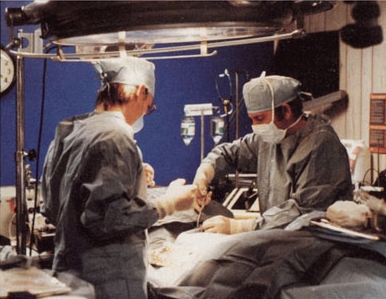THINKING ABOUT SPINAL SURGERY?
THINK AGAIN!
Unnecessary Spinal Surgery:
A Prospective 1-year Study of One Surgeon's Experience
Dr. Nancy Hood of the Department of Neurological Surgery, The Albert Einstein College of Medicine, Bronx, New York. The paper was called "Unnecessary" Spinal Surgery: A Prospective 1-Year Study of One Surgeon's Experience. The study's abstract is below. If you are one of those thinking about a spinal surgery, read this first! And absolutely stick around for the comments by the readers (neurosurgeons).
ABSTRACT:
Background: There are marked disparities in the frequency of spinal surgery performed within the United States over time, as well as across different geographic areas. One possible source of these disparities is the criteria for surgery.
Methods: During a one-year period [November 2009-October 2010], the senior author, a neurosurgeon, saw 274 patients for cervical and lumbar spinal, office consultations. A patient was assigned to the "unnecessary surgery" group if they were told they needed spinal surgery by another surgeon, but exhibited pain alone without neurological deficits and without significant abnormal radiographic findings [dynamic X-rays, MR scans, and/or CT scans].
Results: Of the 274 consults, 45 patients were told they needed surgery by outside surgeons, although their neurological and radiographic findings were not abnormal. An additional 2 patients were told they needed lumbar operations, when in fact the findings indicated a cervical operation was necessary. These 47 patients included 21 [23.1%] of 91 patients with cervical complaints, and 26 [14.2%] of 183 patients with lumbar complaints. The 21 planned cervical operations included 1-4 level anterior diskectomy/fusion [18 patients], laminectomies/fusions [2 patients], and a posterior cervical diskectomy [1 patient]. The 26 planned lumbar operations involved single/multilevel posterior lumbar interbody fusions: 1-level [13 patients], 2-levels [7 patients], 3-levels [3 patients], 4-levels [2 patients], and 5-levels [1 patient]. In 29 patients there were one or more overlapping comorbidities.
Conclusions: During a one-year period, 47 [17.2%] of 274 spinal consultations seen by a single neurosurgeon were scheduled for "unnecessary surgery".
COMMENTS BY READERS:
I have been practicing spinal surgery in Japan since 1980..... Through the communication with friends practicing neurosurgery in the US and with information from journals and meetings, I have noticed many different points in the rate and method of spinal surgery in the US and the other countries including Japan. As pointed out by the author, "unnecessary" spinal surgery was 17.2% in spinal consultation for the second opinion and overlapping comorbidities are as many as 29 out of 47 (62%).
Significant increase of the rate of spinal surgery is attributed mainly to the development of diagnostic tools and operative techniques and implants in addition to increasing aged population in most countries [ (HERE & HERE) ]. However, the situation in the US seems to be a little bit different because of unusually high rate of spinal surgery. I am afraid that "unnecessary" spinal surgery and also "oversurgery" may be related to the money-oriented society which will subsequently jack up the medical costs and increase the rate of malpractice insurance.
-Dr. Hiroshi Nakagawa. Professor Emeritus Aichi Medical University. Nagoya, Japan
Most of these procedures involved fusion which is more aggressive both biologically and economically as compared to nonoperative management or simple decompressions. Fusion was recommended for all of the lumbar procedures and half of these procedures were multilevel. The evidence supporting multilevel lumbar fusion for axial pain is very weak and even if the authors missed some cases of facet arthropathy this entity does not require a multilevel fusion.
-Dr. Vincent C. Traynelis, Rush University Medical Center, Chicago, IL
-Gilbert Dechambenoit . Health Economist, Boulogne, France
Dr. Edward Benzel. Chairman, Department of Neurosurgery, Cleveland Clinic
Greed: A hospital reviewing surgical procedures noted that a significant number of patients scheduled for anterior lumbar interbody fusions did not meet criteria. The committee requested that any spine surgeon contemplating this surgery had to have the chart reviewed by another spine surgeon at that hospital. ALIF procedures dropped by 75%. Greed is not a malady of just spine surgeons. The same committee began to investigate cardiac catheterizations, which had a very high rate of normal studies. This is a big money maker for a hospital. The solution for the administration was to disband the committee. Most physicians will remember the number of cataract operations that were being done on nursing home residents, many of whom were confined to wheelchairs. At that time Medicare paid $1800 per eye - a gold mine for the ophthalmologist. Medicare solved the problem by reducing the fee to $600. And then there is the greed of the medical supply company. When the spine surgeons in a hospital were requested by the administration to utilize one or two pedicle screws determined by bid, all the companies suddenly cut the price in half - for screws that nobody would pay $50 for at the Home Depot.
Ignorance: As this paper also notes, the wrong operation is sometimes suggested. For another example is the middle-aged lady who was told by a spine surgeon she needed a four level anterior cervical discectomy and fusion for degenerative disease reported on MRI. Her complaint was radiating pain into her left forefinger. She sought out a second opinion. This spine surgeon noted weakness of the left triceps and reviewed the MRI, which showed a foraminal ruptured disc at left C6-C7 and missed by the radiologist. The problem was resolved by simple discectomy. The primary surgeon failed to listen to the patient, examine her adequately and put too much faith in the radiologist.
Stupidity: I guess we all do something that in retrospect we realize was probably stupid. But this case I think has to be a classic. A well-respected spine surgeon was challenged for having, over the period of a few years, fused every vertebrae but one in a patient. When challenged, his answer was that 'the patient wanted it'. I hope that a physician can have a better reason for treating a patient than that.
The big problem is greed. I hate to say it but most neurosurgeons want to do spine surgery because, at this time, it is lucrative. What is the solution - and there will be one. Either we solve the problem or the government will. I suggest that every hospital doing spine fusions establish a review committee to which the chart on every patient to be scheduled for fusion is reviewed to be sure that appropriate criteria are met. I suspect that this will reduce spine fusions by 20% or more. If we continue to ignore the problem then the government will step in, in a global fashion, by severely cutting the reimbursement for spinal fusion to the point that it will not pay to do that operation. Or worse, we will all be employees of the hospital or government.
Dr. Harold D. Portnoy. Director, The Hydrocephalus Clinic, St. Joseph Mercy, Pontiac, MI
9. Orszag PR: Growth in Health Care Costs: Testimony before the Committee on the Budget, United States Senate, January 31, 2008. (http://www.cbo.gov/doc.cfm?index=8948) [Accessed March 10, 2010]
10. US Department of Health and Human Services: Centers for Medicare and Medicaid Services: National Health Expenditure Data for 2007. (http://www.cms.hhs.gov/National- HealthExpendData/02_NationalHealthAccounts Historical. asp#TopOfPage) [Accessed March 10, 2010]
11. Walcott BP, Hanak BW, Caracci JR, Redjal NR, Nahed BV, Kahle K T Coumans JV. Trends in inpatient setting laminectomy for excision of herniated intervertebral disc: population-based estimates from the US nationwide inpatient sample. Surg Neurol Int 2011;2:7
If you are contemplating your doctor's suggestion to have surgery on your spine, get a second opinion. And then get a third opinion. And unless it's some sort of rare medical emergency such a Cauda Equina Syndrome, please at least talk to me. Call (417) 934-6337 to schedule a free, no-obligation consultation to see WHETHER YOU MIGHT BE A GOOD CANDIDATE for Spinal Decompression Therapy.




 RSS Feed
RSS Feed
